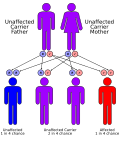Adenylosuccinate lyase deficiency
| Adenylosuccinate lyase deficiency | |
|---|---|

| |
| Synonyms | ADSL deficiency, adenylosuccinase deficiency |
| Pronounce | N/A |
| Specialty | N/A |
| Symptoms | Developmental delay, autism spectrum disorder, epilepsy, muscle weakness |
| Complications | N/A |
| Onset | Infancy |
| Duration | Lifelong |
| Types | N/A |
| Causes | Mutations in the ADSL gene |
| Risks | Family history of the condition |
| Diagnosis | Genetic testing, metabolic screening |
| Differential diagnosis | Other inborn errors of purine metabolism |
| Prevention | N/A |
| Treatment | Supportive care, symptomatic treatment |
| Medication | N/A |
| Prognosis | Variable, often severe |
| Frequency | Rare |
| Deaths | N/A |
Adenylosuccinate lyase deficiency
A rare metabolic disorder affecting purine metabolism
Adenylosuccinate lyase deficiency is a rare metabolic disorder that affects the purine metabolism pathway. It is characterized by a deficiency in the enzyme adenylosuccinate lyase (ASL), which plays a crucial role in the conversion of adenylosuccinate to adenosine monophosphate (AMP) and fumarate. This deficiency leads to the accumulation of succinylpurines in the body, which can cause a variety of symptoms, primarily affecting the nervous system.
Pathophysiology[edit]
Adenylosuccinate lyase is an enzyme involved in two key reactions in the purine nucleotide cycle:
- The conversion of adenylosuccinate to adenosine monophosphate (AMP) and fumarate.
- The conversion of succinylaminoimidazole carboxamide ribotide (SAICAR) to aminoimidazole carboxamide ribotide (AICAR) and fumarate.
In individuals with adenylosuccinate lyase deficiency, mutations in the ASL gene lead to reduced or absent enzyme activity. This results in the accumulation of succinylpurines, which are toxic to the central nervous system.
Clinical features[edit]
The clinical presentation of adenylosuccinate lyase deficiency can vary widely among affected individuals. Common symptoms include:
The severity of symptoms can range from mild to severe, and some individuals may also experience intellectual disability.
Diagnosis[edit]
Diagnosis of adenylosuccinate lyase deficiency is typically based on clinical evaluation, biochemical testing, and genetic analysis. Key diagnostic steps include:
- Measurement of succinylpurines in urine or cerebrospinal fluid using mass spectrometry.
- Genetic testing to identify mutations in the ASL gene.
Treatment[edit]
Currently, there is no cure for adenylosuccinate lyase deficiency. Treatment is primarily supportive and symptomatic, focusing on managing seizures, developmental delays, and other associated symptoms. Interventions may include:
- Antiepileptic drugs for seizure control.
- Physical therapy and occupational therapy to improve motor skills.
- Speech therapy to address communication difficulties.
Prognosis[edit]
The prognosis for individuals with adenylosuccinate lyase deficiency varies depending on the severity of the condition. Early diagnosis and intervention can help improve outcomes, but many individuals may continue to experience significant challenges throughout their lives.
Related pages[edit]
Gallery[edit]
-
Autosomal recessive inheritance pattern
-
Lysine structure
-
ASL active sites
-
S-adenosylmethionine
Adenylosuccinate_lyase_deficiency[edit]
-
Autosomal recessive inheritance pattern
-
Lysine phosphorylation
-
Adenylosuccinate lyase active sites
-
S-adenosylmethionine space-filling model
Ad. Transform your life with W8MD's Budget GLP-1 injections from $49.99


W8MD offers a medical weight loss program to lose weight in Philadelphia. Our physician-supervised medical weight loss provides:
- Weight loss injections in NYC (generic and brand names):
- Zepbound / Mounjaro, Wegovy / Ozempic, Saxenda
- Most insurances accepted or discounted self-pay rates. We will obtain insurance prior authorizations if needed.
- Generic GLP1 weight loss injections from $49.99 for the starting dose of Semaglutide and $65.00 for Tirzepatide.
- Also offer prescription weight loss medications including Phentermine, Qsymia, Diethylpropion, Contrave etc.
NYC weight loss doctor appointmentsNYC weight loss doctor appointments
Start your NYC weight loss journey today at our NYC medical weight loss and Philadelphia medical weight loss clinics.
- Call 718-946-5500 to lose weight in NYC or for medical weight loss in Philadelphia 215-676-2334.
- Tags:NYC medical weight loss, Philadelphia lose weight Zepbound NYC, Budget GLP1 weight loss injections, Wegovy Philadelphia, Wegovy NYC, Philadelphia medical weight loss, Brookly weight loss and Wegovy NYC
|
WikiMD's Wellness Encyclopedia |
| Let Food Be Thy Medicine Medicine Thy Food - Hippocrates |
Medical Disclaimer: WikiMD is not a substitute for professional medical advice. The information on WikiMD is provided as an information resource only, may be incorrect, outdated or misleading, and is not to be used or relied on for any diagnostic or treatment purposes. Please consult your health care provider before making any healthcare decisions or for guidance about a specific medical condition. WikiMD expressly disclaims responsibility, and shall have no liability, for any damages, loss, injury, or liability whatsoever suffered as a result of your reliance on the information contained in this site. By visiting this site you agree to the foregoing terms and conditions, which may from time to time be changed or supplemented by WikiMD. If you do not agree to the foregoing terms and conditions, you should not enter or use this site. See full disclaimer.
Credits:Most images are courtesy of Wikimedia commons, and templates, categories Wikipedia, licensed under CC BY SA or similar.
Translate this page: - East Asian
中文,
日本,
한국어,
South Asian
हिन्दी,
தமிழ்,
తెలుగు,
Urdu,
ಕನ್ನಡ,
Southeast Asian
Indonesian,
Vietnamese,
Thai,
မြန်မာဘာသာ,
বাংলা
European
español,
Deutsch,
français,
Greek,
português do Brasil,
polski,
română,
русский,
Nederlands,
norsk,
svenska,
suomi,
Italian
Middle Eastern & African
عربى,
Turkish,
Persian,
Hebrew,
Afrikaans,
isiZulu,
Kiswahili,
Other
Bulgarian,
Hungarian,
Czech,
Swedish,
മലയാളം,
मराठी,
ਪੰਜਾਬੀ,
ગુજરાતી,
Portuguese,
Ukrainian


